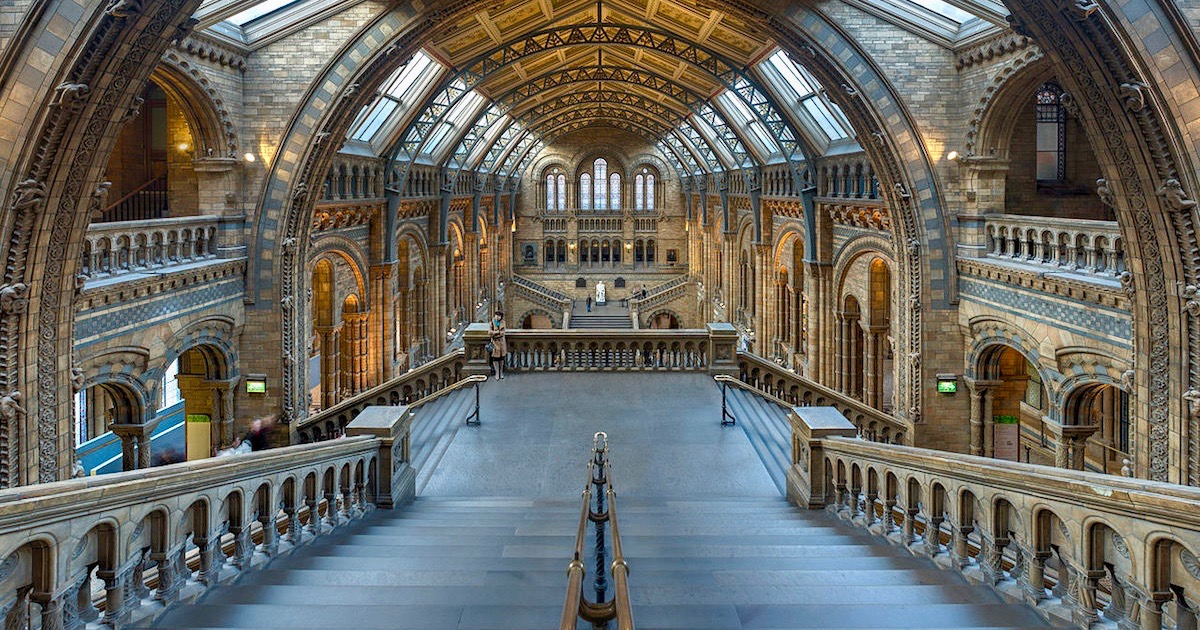 Education
Education
U.K. Museum Director Calls for Venerating Evolution as “Irrefutable”

“The removal of Darwin and evolution from schools is a backwards step,” writes Michael Dixon, director of London’s Natural History Museum, in The Guardian. Yes, it would very much be a backward step if anyone serious were proposing it in the U.S. or Britain. He cites “alarming reports from both Israel and Turkey,” although not being on the ground in either of those places makes it harder to assess how “alarmed” we should be.
Dixon goes on to advocate for a one-sided presentation of evolution to schoolchildren.
If you remember, this is the museum founded by structuralist Richard Owen. The leadership there demonstrated its respect for Owen, a great scientist ahead of his time, by replacing a prominently placed 2,000-pound statue of him with one of Charles Darwin.
Dixon mentions that India’s minister for higher education, Satyapal Singh, questioned evolutionary theory and stated that it should be removed from curricula.
I heartily agree that evolution should be taught and definitely not removed from K12 science curricula. However, it should be taught objectively. As our Science Education Policy states:
Discovery Institute seeks to increase the coverage of evolution in curricula. It believes that evolution should be fully and completely presented to students, and they should learn more about evolutionary theory, including its unresolved issues. In other words, evolution should be taught as a scientific theory that is open to critical scrutiny, not as a sacred dogma that can’t be questioned.
Strangely Dogmatic
Removing evolution from biology classes is a bad idea. But Dixon’s attitude is strangely dogmatic. He notes:
Darwin’s theory of evolution not only underpins all biological science, it has an immense predictive power. From understanding the emergence of antibiotic-resistant organisms, to the ways in which different species might respond to global warming — emerging as new pests or sustainable sources of food — human health and prosperity will depend on decisions informed by evolutionary evidence. [Emphasis added.]
Evolution “underpins all biological science”? Nothing less than “human health and prosperity” are at stake? These are some extreme claims. But it gets weirder.
Holy Kaaba of Science
Dixon notes that evolution “is considered irrefutable scientific law.” Yes, it is considered that by some, but whether any scientific idea is properly venerated this way, as “irrefutable,” sacrosanct, to be violated only on pain of having your reputation or career demolished, is another question entirely. As Granville Sewell and I wrote recently for The American Spectator:
Whether the standard neo-Darwinian mechanism fully explains the origins of biological novelties is a question that scientists themselves increasingly contest. Yet for the media, evolution is the holy Kaaba of science. Resistance verging on hysteria greets attempts to allow teachers to introduce mainstream controversies found in peer-reviewed scientific literature.
It’s an interesting irony: Today’s culture embraces relativism. Many would say that what works for you is “your truth,” and what works for me is “my truth.” There’s one exception to that rule: evolution. That is everyone’s truth, so you’d better pipe down and get used to it if you know what’s good for you.
Teach More Evolution!
This way of thinking is very different from the bench science knowledge and practices students need to learn in science class. Discovery Institute recommends an analytical approach — teaching the scientific strengths and weaknesses of evolution in biology class. Yes, teach evolution! Teach more about evolution! And present it objectively, engaging students in scientific inquiry.
The approaches advocated by Michael Dixon and Satyapal Singh represent two extremes. A third way exists. Consider this from Texas’s science standards: “Analyze and evaluate the relationship of natural selection to adaptation and to the development of diversity in and among species…” Good idea: critical thinking instead of stripping out parts of the curriculum or declaring evolution to be “irrefutable.”
I do admire Dixon’s wish for quality science education. He writes:
So how should we respond to overt or insidious attempts to undermine this vital scientific concept? We must — of course — teach it in schools as the core part of any science curriculum. And we must speak up to defend scientific evidence and rational debate. But more than these things, we must inspire children with the sheer wonder and variety of nature, and ignite their curiosity in the world around them. These ideas are at the heart of all our public engagement at the Natural History Museum, because we believe that reconnecting with nature and empowering our visitors to understand how the choices we make could impact the world around us are urgent, vital tasks.
Inspiring children by introducing them to nature. Empowering people to make responsible choices about the environment and the world. Yes, please, more of all that. But how to achieve these worth goals?
Wonder comes from probing nature, asking big questions, and trying to find things out for yourself. That’s what scientists do, and teaching students to do similarly may inspire them to seek a future in science. It must happen in origins science as well as other fields. In this way, science education may catalyze the next wave of scientific exploration.
Dixon concludes:
As the top science attraction in the UK, the Natural History Museum will always be a refuge for those who want to discover more about the natural world. We will continue to defend Darwin’s legacy, the theory of evolution — the only evidence-based explanation for the epic, wonderful diversity of life on Earth.
The highest calling for a great museum like Dixon’s is not to be a refuge. It is to be a portal — a portal for scientific discovery.
Photo: Natural History Museum, London, by Diliff [CC BY-SA 3.0 or GFDL], from Wikimedia Commons.
